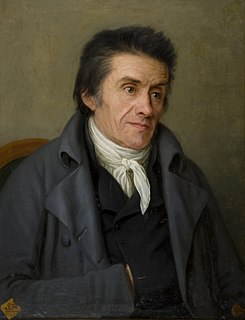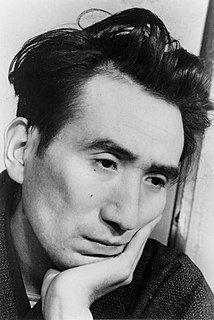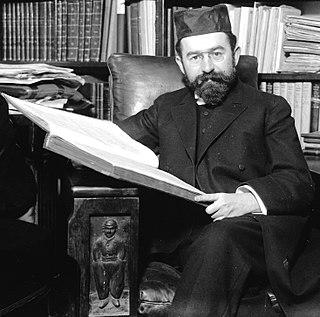A Quote by Thomas Hobbes
Desire , to know why, and how, CURIOSITY; such as is in no living creature but Man ; so that Man is distinguished, not only by his Reason; but also by this singular Passion from other Animals ; in whom the appetite of food, and other pleasures of Sense, by predominance, take away the care of knowing causes; which is a Lust of the mind, that by a perseverance of delight in the continual and indefatigable generation of Knowledge, exceedeth the short vehemence of any carnal Pleasure.
Related Quotes
We do not ask what hope of gain makes a little bird warble, since we know that it takes delight in singing because it is for that very singing that the bird was made, so there is no need to ask why the human mind undertakes such toil in seeking out these secrets of the heavens. ... And just as other animals, and the human body, are sustained by food and drink, so the very spirit of Man, which is something distinct from Man, is nourished, is increased, and in a sense grows up on this diet of knowledge, and is more like the dead than the living if it is touched by no desire for these things.
I do not see any reason why animals should be slaughtered to serve as human diet when there are so many substitutes. After all, man can live without meat. It is only some carnivorous animals that have to subsist on flesh. Killing animals for sport, for pleasure, for adventures, and for hides and furs is a phenomenon which is at once disgusting and distressing. There is no justification in indulging in such acts of brutality . . . Life is as dear to a mute creature as it is to a man. Just as one wants happiness and fears pain, just as one wants to live and not to die, so do other creatures.
It is in virtue of his own desires and curiosities that any man continues to exist with even patience, that he is charmed by the look of things and people, and that he wakens every morning with a renewed appetite for work and pleasure. Desire and curiosity are the two eyes through which he sees the world in the most enchanted colours...and the man may squander his estate and come to beggary, but if he keeps these two amulets he is still rich in the possibilities of pleasure.
Whenever any one informs us that he has found a man who knows all the arts, and all things else that anybody knows, and every single thing with a higher degree of accuracy than any other man - whoever tells us this, I think that we can only imagine him to be a simple creature who is likely to have been deceived by some wizard or actor whom he met, and whom he thought all-knowing, because he himself was unable to analyse the nature of knowledge and ignorance and imitation.
The delight we take in our senses is an implicit desire to know the ultimate reason for things, the highest cause. The desire for wisdom that philosophy etymologically is is a desire for the highest or divine causes. Philosophy culminates in theology. All other knowledge contains the seeds of contemplation of the divine.
Thinking leads man to knowledge. He may see and hear, and read and learn, as much as he please; he will never know any of it, except that which he has thought over, that which by thinking he has made the property of his mind. Is it then saying too much if I say, that man by thinking only becomes truly man? Take away thought from man's life, and what remains?
One of the commonest causes of failure in Christian life is found in the attempt to follow some good man whom we greatly admire. No man and no woman, no matter how good, can be safely followed. If we follow any man or woman, we are bound to go astray. There has been but one absolutely perfect Man on this earth-the Man Christ Jesus. If we try to follow any other man we are surer to imitate his faults than his excellencies. Look to Jesus and Jesus only as your Guide.
Man is distinguished from the brute animals in proportion as thought prevails over sense: but in the healthy processes of the mind, a balance is constantly maintained between the impressions from outward objects and the inward operations of the intellect:--for if there be an overbalance in the contemplative faculty, man thereby becomes the creature of mere meditation, and loses his natural power of action.
Mother, recently I have discovered the one way in which human beings differ completely from other animals. Man has, I know, language, knowledge, principles, and social order, but don't all the other animals have them too, granted the difference of degree? Perhaps the animals even have religions. Man boasts of being the lord of all creation, but it would seem as if essentially he does not differ in the least from other animals. But, Mother, there was one way I thought of. Perhaps you won't understand. It's a faculty absolutely unique to man - having secrets. Can you see what I mean?
Man with all his noble qualities, with sympathy which feels for the most debased, with benevolence which extends not only to other men but to the humblest living creature, with his god-like intellect which has penetrated into the movements and constitution of the solar system- with all these exalted powers- Man still bears in his bodily frame the indelible stamp of his lowly origin.
What distinguished man from animals was the human capacity for symbolic thought, the capacity which was inseparable from the development of language in which words were not mere signals, but signifiers of something other than themselves. Yet the first symbols were animals. What distinguished men from animals was born of their relationship with them.
I know that in many things I am not like others, but I do not know what I really am like. Man cannot compare himself with any other creature; he is not a monkey, not a cow, not a tree. I am a man. But what is it to be that? Like every other being, I am a splinter of the infinite deity, but I cannot contrast myself with any animal, any plant or any stone. Only a mythical being has a range greater than man's. How then can man form any definite opinions about himself?.







































